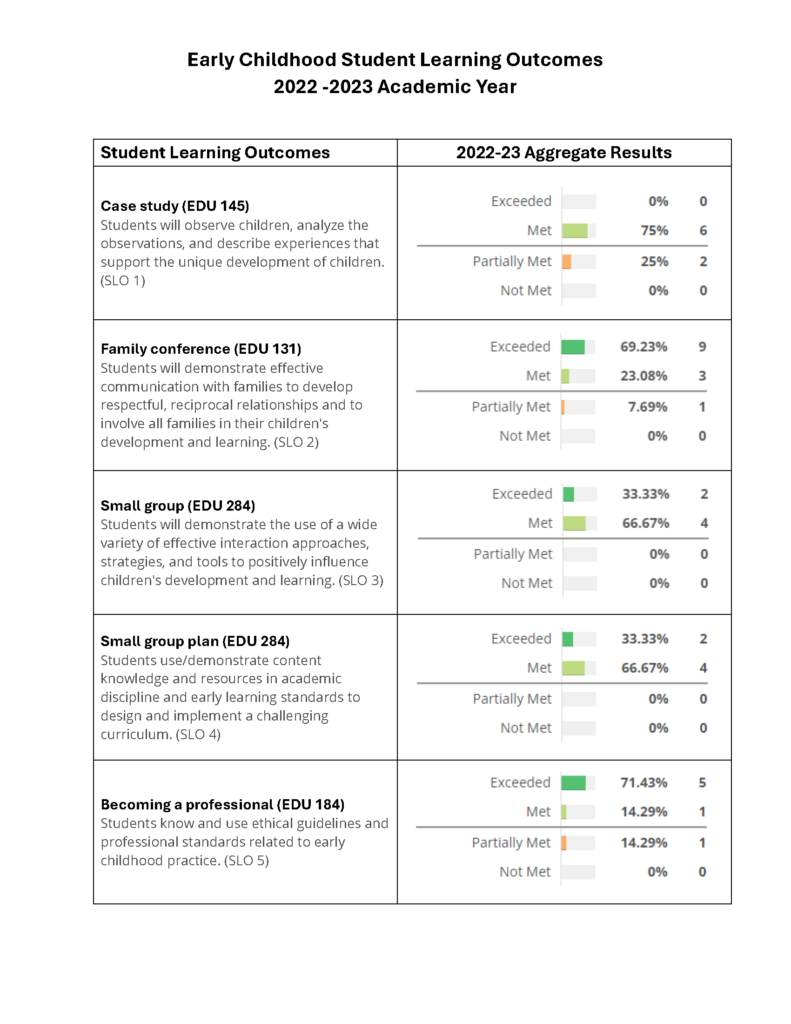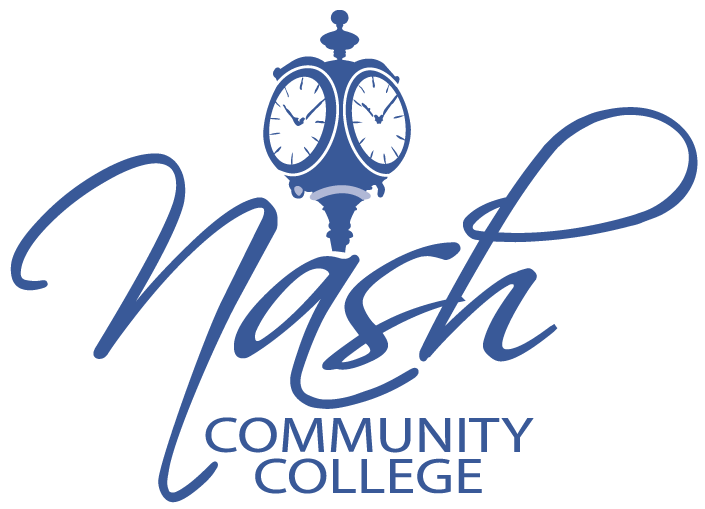Overview
The Early Childhood Education curriculum prepares individuals to work with children from infancy through middle childhood in diverse learning environments. Students will combine learned theories with practice in actual settings with young children under the supervision of qualified teachers.
What You'll Learn
Coursework includes child growth and development; physical/nutritional needs of children; care and guidance of children; and communication skills with parents and children. Students will foster the cognitive/language, physical/motor, social/emotional and creative development of young children.
Career Opportunities
Graduates are prepared to plan and implement developmentally appropriate programs in early childhood settings. Employment opportunities include child development and child care programs, preschools, public and private schools, recreational centers, Head Start Programs, and school-age programs.
Early childhood graduates must obtain a grade of “C” or better in each course in order to progress to a subsequent course and fulfill graduation requirements. Students enrolled in the transfer pathways must also have a minimum GPA of 2.0 on a 4.0 scale.
NON-TRANSFER
LICENSURE TRANSFER
NON-LICENSURE TRANSFER
NON-TRANSFER
Major Core Courses
- EDU 119 Intro. to Early Childhood Education
- EDU 131 Child, Family & Community
- EDU 144 Child Development I
- EDU 145 Child Development II
- EDU 146 Child Guidance
- EDU 151 Creative Activities
- EDU 153 Health, Safety & Nutrition
- EDU 221 Children with Exceptionalities
- EDU 234 Infants, Toddlers & Twos
- EDU 280 Language & Literacy Experiences
- EDU 284 EC Capstone
Other Major Courses
- EDU 184 Early Childhood Intro Pract
- SOC 210 Introduction to Sociology
- EDU 261 Early Childhood Administration I
- EDU 262 Early Childhood Administration II
- EDU 259 Curriculum Planning
- EDU 282 Early Childhood Literature
General Education
- COM 231 Public Speaking
- ENG 111 Writing & Inquiry
- ENG 114 Professional Research & Reporting
- MAT 143 Quantitative Literacy
- PSY 150 General Psychology
- Humanities/Fine Arts Elective
Other Required Courses
- ACA 122 University Transfer Success
HUM/FA Elective (Select 1 course)
ART 111, ART 114, ART 115, DRA 111, ENG 231, ENG 232, ENG 233, ENG 241, ENG 242, ENG 261, ENG 262, HUM 110, HUM 115, HUM 120, HUM 130, HUM 150, HUM 160, HUM 180, HUM 211, HUM 212, MUS 110, MUS 112, PHI 215, PHI 220, PHI 230, PHI 240, REL 110, REL 211, REL 212
LICENSURE TRANSFER
Major Core Courses
- EDU 119 Intro. to Early Childhood Education
- EDU 131 Child, Family, & Community
- EDU 144 Child Development I
- EDU 145 Child Development II
- EDU 146 Child Guidance
- EDU 151 Creative Activities
- EDU 153 Health, Safety & Nutrition
- EDU 221 Children with Exceptionalities
- EDU 234 Infants, Toddlers and Twos
- EDU 280 Language & Literacy Experiences
- EDU 284 EC Capstone
Other Major Courses
- EDU 184 Early Childhood Intro Pract
- SOC 210 Introduction of Sociology
- EDU 216 Foundations in Education
- EDU 250 Teacher Licensure Preparation
- BIO 110 Principles of Biology or BIO 111 General Biology
General Education
- COM 231 Public Speaking
- ENG 111 Writing and Inquiry
- ENG 114 Professional Research & Reporting
- MAT 143 Quantitative Literacy
- PSY 150 General Psychology
- Humanities/Fine Arts Elective
- Natural Science Elective
Natural Science Elective (select 1 science with lab from the courses below)
- AST 111 and AST 111A
- CHM 151
- GEL 111 Gelo
- PHY 110 and PHY 110A
Other Required Courses
- ACA 122 University Transfer Success
HUM/FA Elective (Select 1 course)
ART 111, ART 114, ART 115, DRA 111, ENG 231, ENG 232, ENG 233, ENG 241, ENG 242, ENG 261, ENG 262, HUM 110, HUM 115, HUM 120, HUM 130, HUM 150, HUM 160, HUM 180, HUM 211, HUM 212, MUS 110, MUS 112, PHI 215, PHI 220, PHI 230, PHI 240, REL 110, REL 211, REL 212
NON-LICENSURE TRANSFER
Major Core Courses
- EDU 119 Intro. to Early Childhood Education
- EDU 131 Child, Family, & Community
- EDU 144 Child Development I
- EDU 145 Child Development II
- EDU 146 Child Guidance
- EDU 151 Creative Activities
- EDU 153 Health, Safety & Nutrition
- EDU 221 Children with Exceptionalities
- EDU 234 Infants, Toddlers and Twos
- EDU 280 Language & Literacy Experiences
- EDU 284 EC Capstone
Other Major Courses
- EDU 184 Early Childhood Intro Pract
- SOC 210 Introduction of Sociology
- EDU 261 Early Childhood Administration I
- EDU 262 Early Childhood Administration II
- BIO 110 Principles of Biology or BIO 111 General Biology
General Education
- COM 231 Public Speaking
- ENG 111 Writing and Inquiry
- ENG 114 Professional Research & Reporting
- MAT 143 Quantitative Literacy
- PSY 150 General Psychology
- Humanities/Fine Arts Elective
- Natural Science Elective
Other Required Courses
- ACA 122 University Transfer Success
HUM/FA Elective (Select 1 course)
ART 111, ART 114, ART 115, DRA 111, ENG 231, ENG 232, ENG 233, ENG 241, ENG 242, ENG 261, ENG 262, HUM 110, HUM 115, HUM 120, HUM 130, HUM 150, HUM 160, HUM 180, HUM 211, HUM 212, MUS 110, MUS 112, PHI 215, PHI 220, PHI 230, PHI 240, REL 110, REL 211, REL 212
Major Core Courses
- EDU 119 Intro. to Early Childhood Education
- EDU 131 Child, Family, & Community
- EDU 144 Child Development I
- EDU 145 Child Development II
- EDU 146 Child Guidance
- EDU 151 Creative Activities
- EDU 153 Health, Safety & Nutrition
Other Major Courses
- EDU 184 Early Childhood Intro Pract
- EDU 234 Infants, Toddlers and Twos
- EDU 259 Curriculum Planning
General Education
- ENG 111 Writing and Inquiry
- ENG 114 Professional Research & Reporting
Other Required Courses
- ACA 122 University Transfer Success
- ECE – EARLY CHILDHOOD CERTIFICATE – C55220
- ECE – INFANT TODDLER CERTIFICATE – C55220H
- ECE – INTENTIONAL TEACHER CERTIFICATE – C55220J
- ECE – SCHOOL-AGE CERTIFICATE – C55220I
- ECE – TEACHER ASSOCIATE CERTIFICATE – C55220B
- ECE – EARLY CHILDHOOD ADMINISTRATION CERTIFICATE – C55220G
- ECE – EARLY CHILDHOOD CTE CERTIFICATE – C55220K
- Early Childhood: Birth-Kindergarten Teacher Checklist
- Early Childhood: Non-Licensure Checklist
- Early Childhood: Non-Transfer Checklist
- Early Childhood Education Handbook
- Early Childhood: Non-Transfer Checklist
- Early Childhood: Non-Licensure Checklist
- Early Childhood: Birth-Kindergarten Teacher Checklist
- Early Childhood Certificates
Program Completers
| Academic Year | Number of Program Completers | % of program completers who were attending full-time (at the time of completion) | % of program completers who were attending part-time (at the time of completion) |
|---|---|---|---|
| 2020-2021 | 15 | 33.3% | 67.7% |
| 2021-2022 | 17 | 11.8% | 88.2% |
| 2022-2023 | 7 | 14.3% | 85.7% |
Program Completion Rate
Published timeframe for full-time students to complete the program: 2.5 years| Academic year in which a Fall cohort of full-time candidates enrolled in the program | % of those candidates who completed the program within 150% of the published timeframe | % of those candidates who completed the program within 100% (exactly the published timeframe) |
|---|---|---|
| 2018-2019 | 57.1% | 14.3% |
| 2019-2020 | 0% | 0% |
| 2020-2021 | 16.6% | 0% |
Fall to Fall Retention Rate
| Academic Year | % of Part-Time Candidates Enrolled in the Program | Retention Rate among Part-Time Candidates | % of Full-Time Candidates Enrolled in the Program | Retention Rate among Full-Time Candidates |
|---|---|---|---|---|
| 2020-2021 | 60.0% | 61.1% | 40.0% | 62.5% |
| 2021-2022 | 67.9% | 58.3% | 53.1% | 70.6% |
| 2022-2023 | 66.2% | 37.2% | 33.8% | 63.6% |





